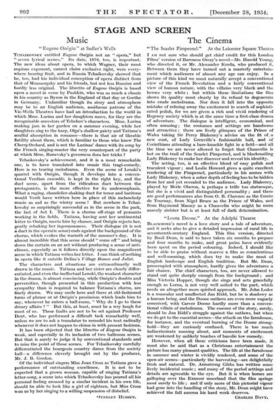STAGE AND SCREEN
Music " Eugene Onegin" at Sadler's Wells TcriAraovsay entitled Eugene Onegin not an " opera," but " seven lyrical scenes." Its date, 1878, too, is important. The new ideas about opera, to which Wagner, their most copious exponent, cannot claim exclusive right, were every- where bearing fruit, and in Russia Tchaikovsky showed that he, too, had his individual conception of opera distinct from that of Moussorgsky and his friends, but not less Russian and hardly less original. The libretto of Eugene Onegin is based upon a novel in verse by Pushkin, who was as much a classic in his country as Byron in the England of that day or Goethe in Germany. Unfamiliar though its story and atmosphere may be to an English audience, assiduous patrons of the Vic-Wells Theatres have had an introduction to the world in which Mine. Larina and her daughters move, for they are the recognizable ancestors of Tchekov's characters. Mme. Larina making jam in her garden on a summer evening, while her daughters sing to the harp, Olga's shallow gaiety and Tatiana's soulful absorption in romance—there is that air of likeable futility about them, which is familiar to those who know The Cherry Orchard, and is not the Larinas' dance with its song by the French singing-master the very counterpart of the party at which Mme. Ranevsky's governess does her tricks ?
Tchaikovsky's achievement, and it is a most remarkable one, is to have translated into music this trail-comedy. Here is no tearing melodrama. Even the scene of Lenski's quarrel with Onegin, though it develops into a conven- tional Verdian ensemble, is kept in the right key, and the duel scene, apart from the ridiculous duet between the protagonists, is the more effective for its underemphasis. What a raging, chandelier-shaking duet for tenor and baritone would Verdi have written here in place of this melancholy music as sad as the wintry scene I But nowhere is Tchai- kovsky so surprisingly successful as in the scene in the park, the last of Act I. There is a chorus off-stage of peasants working in the fields. Tatiana, having sent her sentimental letter to Onegin, meets him by chance, and Onegin rejects her, gently rebuking her ingenuousness. Their dialogue (it is not a duet in the operatic sense) ends against the background of the chorus, which evokes the warmth of the summer's day. It is almost incredible that this scene should " come off " and bring down the curtain on an act without producing a sense of anti- climax, especially as it follows directly upon the magnificent scene in which Tatiana writes her letter. I can think of nothing in opera like it outside Delius's Village Romeo and Juliet.
The characters and situations are extraordinarily well drawn in the music. Tatiana and her sister are clearly differ- entiated, and even the ineffectual Lenski, the weakest character in the drama, is almost convincing, while Onegin's doubts and perversities, though presented in this production with less sympathy than is required to balance Tatiana's charm, are finely drawn. We may smile here and there at old-fashioned turns of phrase or at Onegin's pessimism which leads him to say, -whenever he enters a ball-room, " Why do I go to these dreary affairs ? " But this, at least, must be a wry laugh for most of us. These faults are not to be set against Professor Dent, who has performed a difficult task remarkably well, unless we are to ask a translator to remodel his text radically whenever it does not happen to chime in with present fashions.
It has been objected that the libretto of Eugene Onegin is weak, and especially in its inclusion of two ballroom scenes. But that is surely to judge it by conventional standards and to miss the point of those scenes. For Tchaikovsky carefully differentiated the bourgeois country dance from the society ball—a difference cleverly brought out by the producer, Mr. J. B. Gordon.
Of the individual singers Miss Joan Cross as Tatiana gave a performance of outstanding excellence. It is not to be expected that a grown woman, capable of singing Tatiana's letter-song, a scene into which Tchaikovsky has poured all his personal feeling aroused by a similar incident in his own life, should be able to look like a girl of eighteen, but Miss Cross won us by her singing to a willing suspension of disbelief.
OYNELEY HUSSEY.


































 Previous page
Previous page